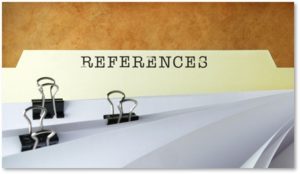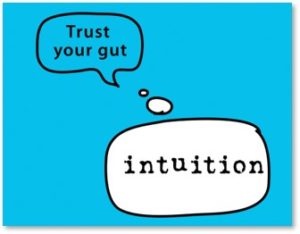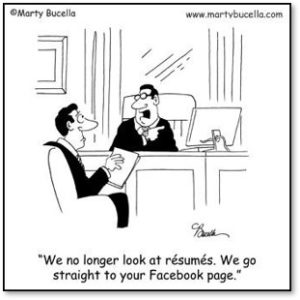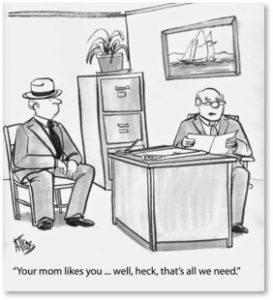 A report issued by Checkster Research earlier this month pinpointed four as the ideal number of reference checks to complete on any candidate before hiring him or her. Okay, that seems reasonable. It minimizes the likelihood that a candidate can pack the court with carefully curated friends and colleagues. Another part of the report made me curious, however.
A report issued by Checkster Research earlier this month pinpointed four as the ideal number of reference checks to complete on any candidate before hiring him or her. Okay, that seems reasonable. It minimizes the likelihood that a candidate can pack the court with carefully curated friends and colleagues. Another part of the report made me curious, however.
Good Reference Checking Needs Good Questions
I conducted a lot of reference checks in my career and got to be good at both giving and receiving them. It was never a comfortable process, however. Although diligent, I made mostly good hires but also a few bad ones.
A good reference check means:
- Asking the right questions
- Listening carefully to the answers, especially what isn’t said
- Following up on what seems like obfuscation or glossing over information
- Listening between the lines and probing into vague answers
- Coordinating the information from different people to form a single picture
Reference checks can range from the slam-dunk (If you don’t hire this person, you’re crazy.) to the minimal (She does what the job requires and comes to work on time.) to the devious (Oh, yeah, he’s a heck of a guy.)
The bottom line on all of them is that a former manager or colleague can only tell you what they know. If they focus only on work done and are blind to the psychological aspect of their employees, they can recommend a sociopath or borderline personality who will wreak havoc in your department. (Of course, they might do this intentionally just to get rid of a problem employee. Caveat emptor.)
Automated Reference Checking
That brings me to the second part of the report:
“Unlike traditional phone reference checks, automated reference checking tools allow employers to gather more references in a fraction of the time compared to manual methods, increasing the quality of reference checks. Digital reference checks collect information from a variety of sources, allowing employers to see the rater’s relationship with the candidate and to inform them whether they’re getting information from a supervisor, peer, or subordinate.”
Automated reference checking tools weren’t available when I was working so I have no direct experience with them. If they are structured like Rotten Tomatoes, gathering comments from a variety of sources and compiling them into a kind of rating system, I can see their value. We all use data aggregation tools like Yelp and TripAdvisor to help us make decisions.
Respecting a Gut Reaction
 Not that I would want to depend on them completely for a new hire, though. I have too much respect for the human gut reaction to base my decision totally on anything automated.
Not that I would want to depend on them completely for a new hire, though. I have too much respect for the human gut reaction to base my decision totally on anything automated.
The report states that
“While companies tend to call an average of 2.4 references when using traditional methods, digital automation tools allow hiring managers to access many more references than would be feasible with phone calls. Because of the confidentiality of the digital process, references feel more comfortable giving candid feedback about candidates.”
I can see where that would work. More than once, I tip-toed through giving a reference on a former member of my department. I didn’t want to scotch their chances for a new job but neither did I want my name attached to a glowing reference for someone who merely did the job and went home. It would have been much simpler, however, to have checked off 20 questions on a form.
Checking Up on the Reference Checkers
 I looked through the web sites for a few of these systems and was relieved to find that they included questions about personality and behavior as well as ability to do the job. The questions are all calm and objective, though. I wanted to see something that asked you to rate on a scale of 1 to 10 that went from “Grab this person before someone else does,” or “OMG! OMG! Run!” But no.
I looked through the web sites for a few of these systems and was relieved to find that they included questions about personality and behavior as well as ability to do the job. The questions are all calm and objective, though. I wanted to see something that asked you to rate on a scale of 1 to 10 that went from “Grab this person before someone else does,” or “OMG! OMG! Run!” But no.
Still, I can see where reference checking software would add value to the hiring process. All information is helpful when you’re evaluating an unknown. And there is nothing more unknown that a human being added to your team. Despite all due diligence and the best reference checks a manager can do, the hiring process can go either way
New-Hire Extremes
 I have seen bad hires who dragged down whole departments. Once I was leery of hiring a man who turned out to be a great team player. A couple of good people were promoted and turned into monsters once they gained some power.
I have seen bad hires who dragged down whole departments. Once I was leery of hiring a man who turned out to be a great team player. A couple of good people were promoted and turned into monsters once they gained some power.
I have given opportunities to people who leveraged them to everyone’s advantage and went on to great careers. And I have bitten my lip—usually under duress—and hired someone who lived down to all my fears.
So, I’m glad to see a technology that might actually help managers instead of trying to replace them. Check out the Checkster Research report and decide for yourself.
